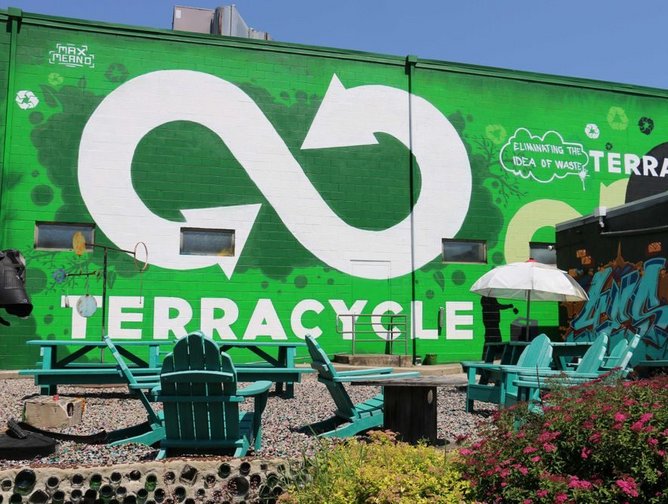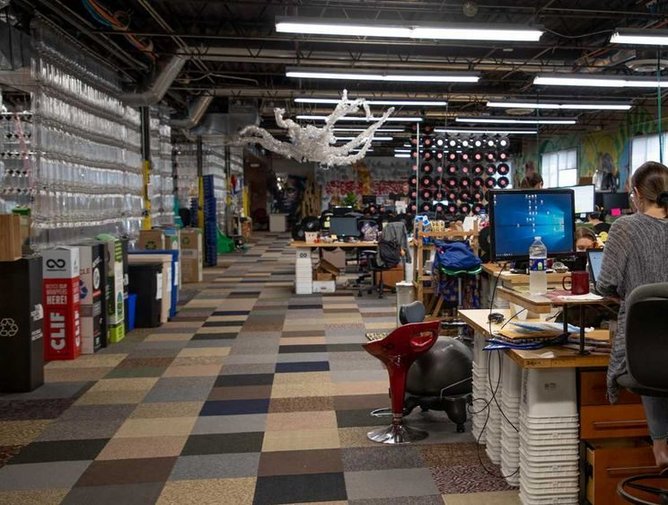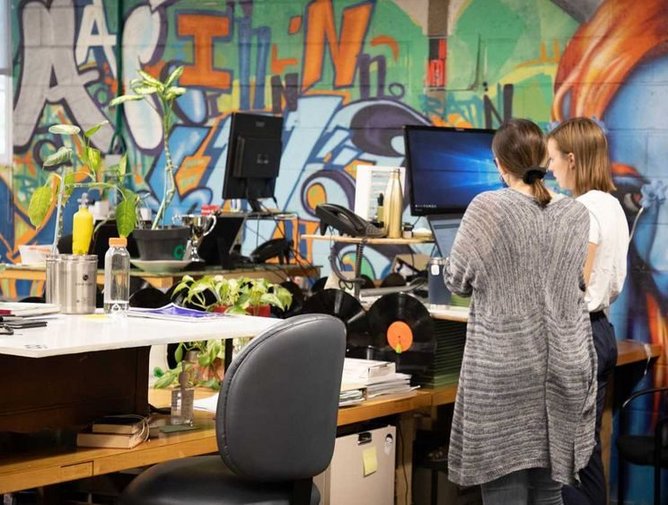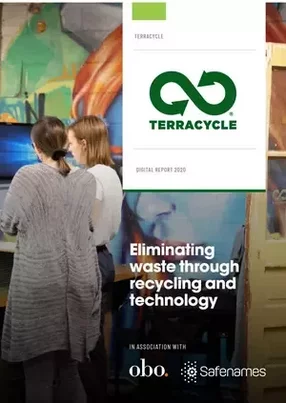TerraCycle: unlocking data to drive next-gen sustainability
Aside from COVID-19, sustainability is arguably one of the foremost business challenges being grappled with across industry segments. Founded in 2001, TerraCycle was established to deal with a singular problem in a focused way: the elimination of the world’s waste. Now operating in 21 countries around the world, the company offers a range of simple platforms to facilitate recycling and lead the global shift towards a more eco-friendly incarnation of the customer’s shopping experience, with particular attention paid to the removal of single-use packaging. As global enterprise reorients itself in order to meet the ‘green’ expectations of modern consumers, TerraCycle will play an important role in transforming inefficient linear systems to fully circular economies.
Speaking to us from an office building decorated in colourfully upcycled materials - old vinyl records arranged as hanging decorations, coats and old maps forming pictures on the walls - Béla Domokos, Chief Information Officer (CIO), makes it immediately clear that TerraCycle practices what it preaches. Coming from a diverse background of experience, including roles at GE Digital and ALDI, Domokos states that, from a technological standpoint, his progression to TerraCycle was in recognition that it was a company within which he could make a significant difference. “I felt that, because of its structure, every person at TerraCycle, no matter where they are on the ladder, has the chance to make an impact. In other companies that’s often not a possibility.” He goes on to say that corporate flexibility and the spirit of recognising those who demonstrate the capability for innovation is something he actively encourages in his leadership: “The idea of meritocracy and people being evaluated based purely on the quality of their work and not necessarily the time that they spend on it, I think, is getting more attention and is more relevant than ever.”
This refocus on leadership became even more important when Domokos took on the CIO role in late 2018 and sought to enhance its scope across TerraCycle’s operations. Recognising that systems and processes are constantly changing and evolving in the IT world, he set about making the presence of technology and its importance felt more deeply within the company. “There was a need for my direct reports to be included in a lot more conversations,” he explains. “Making sure that IT-related vendor management was handled within the department, for example. TerraCycle grew from a small company that was super nimble and could pivot quickly; that’s something we want to continue.” Now with a stronger grasp on its portfolio, the company has gone on to strike more favourable deals than ever before. Part of the company’s agility stems from shifting standards within the IT sector which favour moving away from in-house designed applications and refocusing on using best-in-class tech from third parties. Domokos states that the laborious task of developing software for warehouse management, logistics, accounting, service management and other everyday functions can now be easily handled by outsourcing to cloud providers like Amazon Web Services (AWS). Summarising his philosophy, he says, “We don't build our own app server; we purchase one that meets our needs. If we later want to pivot to something else, TerraCycle can just cancel the subscription.”
TerraCycle’s objective is a large-scale transition within the philosophy of global business - training industries to no longer think about resources in terms of ‘product’ and ‘waste’, but instead finding a use for everything and removing those items which don’t contribute to the cycle of ‘reduce, recycle, reuse’. Circular economics doesn’t just make good ecological sense, it also makes profound business sense too, as Domokos expands upon. “TerraCycle partners with brands like Unilever, PepsiCo or Coca-Cola and then we launch a campaign to collect a specific waste stream, such as toothpaste tubes, diapers, chips bags or drink cans. We guarantee that we are going to recycle this collected material, which in turn generates new material.” It is through these measures that the company reduces the need for items such as single-use virgin plastic. Successful campaigns launched by TerraCycle include one for Walmart collecting children’s car seats, an effort which simultaneously recycled disused items and generated more foot traffic for the company, says Domokos.
Perhaps one of the most exciting aspects of these projects has been the accelerated growth which TerraCycle has experienced. In fact, he claims that despite COVID-19-related disruptions the company will still make a profit at the end of the year. However, he is quick to point out that success often comes with its own challenges and states that the company’s tech infrastructure is in the process of being upgraded, particularly its CRM (customer relationship management) software. “New workflows need to be set up to make sure that recently hired staff can pick up the pace as fast as possible. With more organisations wanting to get involved in our collection programs, we now have the foundation for further growth.” Moreover, Domokos is keen to keep TerraCycle up-to-date with the latest tech trends - trends which will not only determine the direction of the business but also sustainability generally. “Business intelligence (BI) is going to be a big one: making sure that we understand the data that we deal with. I think the whole sustainability space is more aware that data can be used for all kinds of things: how waste is moving around, how it should get collected and what we can do differently.”
This brings him to TerraCycle’s innovative ecommerce platform Loop. A recognisable online retail experience with a twist, Loop provides customers with their favourite leading brands in a sustainably reimagined form exclusively available through the site. Waste-free products are then delivered to their doorstep in a Loop Tote bag specifically manufactured to replace single-use bubble wrap, cardboard boxes and ice packs. Once the products have been used, customers can then place them back inside the Tote and schedule a free pick up at a time convenient for them. The company then empties and cleans the packaging ready for reuse. The endeavour shares a similar philosophy to TerraCycle’s other offerings, such as its variably-sized Zero Waste Box which allows customers to fill it up with almost any kind of waste (domestic or business-related) and return to the company for repurposing. “We don't have many competitors in this space, so there isn't an industry standard for how to do these things; the company is very unique,” Domokos proudly states.
“We have so many ideas because we’re also trying to make sustainability easily accessible, painless and fun for everyone,” he adds. He hopes that one day BI capabilities will marry with e-commerce platforms like Loop to help people make sustainable life choices easier. As the business continues to grow and data streams become larger, leveraging advanced automation such as artificial intelligence (AI) or machine learning (ML) would become necessary. Although such an application has yet to be realised, the potential is highly exciting for the sector. “If you understand the data that's moving in your systems and your business, you can serve people better. Hypothetically, if someone decided to go vegan for the purposes of sustainability, we could create a list for them of all the products that they’d need.”
Whilst the COVID-19 pandemic has made 2020 a strange year for TerraCycle, Domokos is positive that the success it has achieved despite disruption is auspicious for 2021. With the CRM software transition expected to be completed before the end of the year, cybersecurity augmentations to adapt to more data-focused operations (GDPR in Europe and CCPA in the US) and plenty of ambition driving the development of Loop, the company looks set to fly out of the gates come January. Successful remote working practices seem indicative that TerraCycle’s tech infrastructure is ready for the ‘new normal’ and Loop expansions delayed for 2020, such as the UK, Canada, Japan and Germany, are now prepared for end of 2020, early 2021. “Loop US is projected to be profitable by the end of this year,” Domokos concludes, “there's so much more excitement ahead: improving the IT team, the business structure, adding new roles and staying in-tune with the evolving needs of the industry.”




